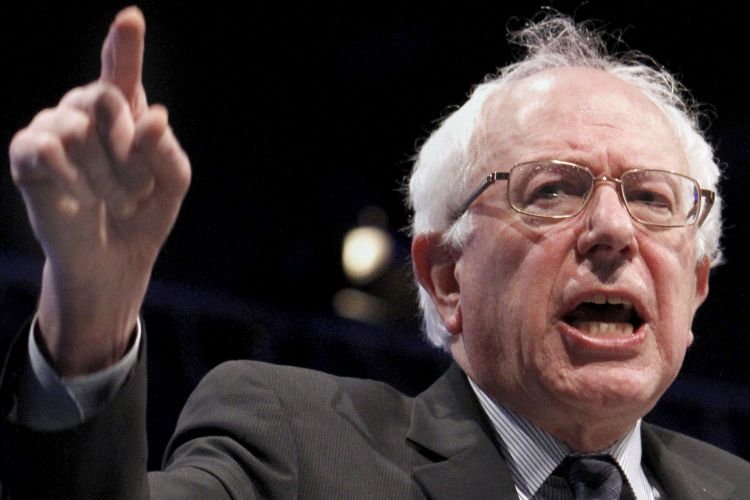Is Bernie Sanders really the only Socialist running for president?

mrctv.org
Bernie Sanders proudly calls himself a socialist. Everyone knows where he stands on the issues. He doesn’t consult pollsters before taking a stand.
Allan Brownfeld Global News Centre
(WASHINGTON DC) Sen. Bernie Sanders (I-VT) is attracting a great deal of interest in his challenge to Hillary Clinton for the Democratic Party’s presidential nomination. In New Hampshire, he has been less than ten points behind Clinton in some polls and he has been attracting impressive crowds in Iowa, New Hampshire and elsewhere.
As Congress considered trade legislation, Clinton ducked questions about the bill while Sanders, who opposed the legislation, said it was embarrassing to see the party’s leading candidate hide from the biggest issues of the day. In Sanders’s view, “You can be for it or against it . But I don’t understand how on an issue of such huge consequences you don’t have an opinion.”
Sanders points out that the trade bill was only the most pressing issue that Clinton had sidestepped. He said that she owes it to voters to answer questions about climate change, domestic spying by the National Security Agency, the Keystone XL oil pipeline and the political dominance of the very rich. He also calls on Clinton to answer more questions about her vote to support the war in Iraq. “I happen to think the war in Iraq was a horrible, horrible mistake. I’m proud I voted against it,” said Sanders.
Bernie Sanders proudly calls himself a socialist. Everyone knows where he stands on the issues. He doesn’t consult pollsters before taking a stand. Whether Sanders really qualifies as a genuine “socialist” is less than clear. Joseph Kishore, national secretary of the Socialist Equality Party, said that, “Mr. Sanders is not a socialist in our view. He’s basically a Democrat and that’s reflected in his decision to run as one.”
It may be that Americans find Bernie Sanders refreshing because, whether they agree with his views or not, they see a man of principle who does not have his finger constantly in the air to see which way the wind is blowing. And—beyond this—-is he really the only socialist in the race, or in American politics? Or is a new, uniquely American form of socialism what genuinely characterizes both of our current political parties?
What we have come to call “crony capitalism” is, after all, a form, of socialism. Under capitalism, business enterprises that fail, cease to exist. In our system, if you are big enough, like Wall Street banks or General Motors, and you go bankrupt, our elected representatives, both Republicans and Democrats, bail you out with taxpayer dollars.
Genuine capitalism—free enterprise—is the best way to organize economic life, with appropriate regulation and a proper safety net. Businessmen, however, want something other than a real free market. Adam Smith once said that when two businessmen get together, the subject of discussion is how to keep the third businessman out of the market. Business has long sought government interference in the market to protect its own interests. Historian Gabriel Kolko discusses how the railroad magnates of the 1870s and 1880s petitioned the government to protect them from the headaches of “cutthroat competition” and relentless rate wars. It was the railroad lobby that promoted the establishment of the Interstate Commerce Commission , which they quickly came to control. In 1907, AT&T faced serious competition from other phone companies. To solve this dilemma, AT&T president Theodore Vail lobbied state governments—and the federal government—to let AT&T become a nationwide monopoly.
Big business, it seems, has always resisted competition and sought to use the power of government to prevent it. In 1909, Andrew Carnegie, irritated with competitors, urged “government control” of the steel industry. In 1911, the chairman of U.S. Steel, Elbert Gary, told Congress, “I believe we must come to enforced publicity (socialization) and government control…even as to price.” Adam Smith said that, “People of the same trade seldom meet together, even for merriment and diversion, but the conversation ends in a conspiracy against the public, or in some contrivance to raise prices.”
Then it was railroads, the steel companies and AT&T. Now it’s Citigroup, Goldman Sachs, AIG and General Motors. Timothy Carney, in his book, “The Big Ripoff,” discussed the ways in which the Obama administration’s cap-and-trade plan will enrich General Electric: “Reviewing their lobbying filings, you might think you were looking at Al Gore’s agenda,” writes Carney. GE spent nearly $20 billion on lobbying on such action items as the “Climate Stewardship Act,” “Electric Utility Cap and Trade Act,” and the “Global Warming Reduction Act.” The reason: GE set up a business to sell carbon credits.
Agriculture, of course, has been subsidized by government for many years. For decades, it has been an unspoken rule among agricultural lobbyists that advocates for one crop do not attack other crops. But now the Corn Refiners Association is about to invest in an effort to eliminate the lucrative breaks afforded to sugar, which are among the most generous in U.S. agriculture. The sugar program, which has existed since the 1930s, supported by both parties, uses an elaborate system of import quotas, price floors and taxpayer-backed loans to prop up domestic growers, which number fewer than 4,500.
Both Jeb Bush and Marco Rubio have a history of supporting the sugar industry, which is centered in their state. The sugar refiners represent some of the biggest and most influential agricultural conglomerates—including Archer Daniels Midland and Cargil. “While every other farm support program has received multiple rounds of reforms, Big Sugar has not been touched,” said John Bode, chief executive of the Corn Refiners Group.
Bode, a former assistant secretary of agriculture during the Reagan and George H.W. Bush administrations, says of the sugar subsidy: “This is pure crony capitalism. Sugar is a mere footnote in American agriculture production, but they make more political contributions than the rest of agriculture combined. That’s why they have defeated all attempts at reform since 1980. When the rest of U.S. agriculture is driving exports, why protect sugar from foreign competition? The program is an anachronism.”
American business wants government largesse, not a government which leaves it alone and permits the market to work. In 2012, corporate America accounted for more than three-quarters of the $3.3 billion spent on lobbying in Washington. General Electric was the market leader, spending $21.4 million, and Google was second with $18.2 million. THE ECONOMIST notes that, “A big American firm may nowadays have a dozen or more full-time registered lobbyists on Capitol Hill, while also employing the services of a couple of dozen lobbying firms from around the 2,000 or so based around K Street. At a moment’s notice, Gucci-clad glad-handers can flood the halls of Congress, and retired politicians on a retainer can be summoned up to ‘make a call.’ Overworked, underpaid officials find there is always a sympathetic lobbyist on hand to help them draft new regulations.”
In a new book, “The Business of America Is Lobbying,” Lee Drutman of the New America Foundation shows that companies have gone from using lobbying simply to protect themselves from higher taxes or stricter regulations to using politics to help them increase profitability. They set the terms of the debate by funding Washington’s many think-tanks and then influence politicians to ensure that legislation locks in their advantage. Studies show that the more companies lobby, the lower their effective tax rate and that firms which lobby are less likely to be detected for fraud than non-lobbying ones.
Professor Mark Mizruchi of the University of Michigan, in his book “The Fracturing of the American Corporate Elite,” illustrates that where companies once lobbied for public goods such as better roads, they now press for company-specific benefits. A classic case of such lobbying was the Medicare Modernization Act of 2003. The lobbyists for the pharmaceutical industry helped to bring new prescription-drug benefits to millions of older Americans, but without any attempt to control costs through means-testing or bulk-buying. Professor John Friedman, an economist at Brown University, estimates that as a result the drugmakers would gain benefits of $242 billion over a ten-year period, an impressive return on the $130 million the industry spent lobbying in the year the law passed.
Republicans like to talk about limited government and balanced budgets, and accuse Democrats of expanding government and fiscal irresponsibility. The Democrats, of course, are guilty as charged. But instead of cutting back government as they urge when out of power, once they gain power, Republicans preside over further government expansion. Under George W. Bush we saw not only government bailouts of failed business enterprises, but the largest budget deficits in history. Under President Obama, deficits have continued to skyrocket. We even have Republicans, like Weekly Standard editors Bill Kristol and Fred Barnes, happily call themselves “big government conservatives.” In the first three years of George W. Bush’s administration, the Cato Institute reports that federal spending increased 13.5 per cent.
In his book “Capitalism and Freedom,” Milton Friedman points out that, “The kind of economic organization that provides economic freedom directly, namely competitive capitalism, also promotes political freedom because it separates economic power from political power and in this way enables the one to offset the other.”
Sadly, neither Republicans nor Democrats nor big business nor Wall Street embrace this form of economic organization. Through lobbying and campaign contributions, we have entered into a bipartisan era of subsidization, bailouts and “crony capitalism.” Senator Bernie Sanders proclaims himself a “socialist,” and in doing so shows himself to be an honest man, however flawed his economic prescriptions may be. But Bernie Sanders is not the only “socialist” in the 2016 presidential contest. He is, however, the only one who seems to be willing to be held accountable for his views about government and the economy.
__________________________________
Allan C. Brownfeld received his B.A. degree from the College of William and Mary, his J.D. degree from the Marshall-Wythe School of Law of the College of William and Mary and his M.A. in Government and Politics from the University of Maryland. He has served on the faculties of St. Stephen’s Episcopal School, Alexandria, Virginia, and the University College of the University of Maryland.
The recipient of a Wall Street Journal Foundation Award, Mr. Brownfeld has written for such newspapers as THE HOUSTON PRESS, THE RICHMOND TIMES DISPATCH, THE WASHINGTON EVENING STAR and THE CINCINNATI ENQUIRER. For many years he wrote three columns a week for such newspapers as THE PHOENIX GAZETTE, THE MANCHESTER UNION LEADER, and THE ORANGE COUNTY REGISTER. His weekly column appeared for more than a decade in ROLL CALL, the newspaper of Capitol Hill. His articles have appeared in such journals as THE YALE REVIEW, THE TEXAS QUARTERLY, THE NORTH AMERICAN REVIEW, ORBIS and MODERN AGE.
Mr. Brownfeld served as a member of the staff of the U.S. Senate Internal Security Subcommittee and was the author of that committee’s 250-page study of the New Left. He has also served as Assistant to the Research Director of the House Republican Conference and as a consultant to such members of Congress as Reps. Phil Crane (R-Il) and Jack Kemp (R-NY) and to the Vice President of the United States.
He is a former editor of THE NEW GUARD and PRIVATE PRACTICE, the journal of the Congress of County Medical Societies and has served as a Contributing Editor AMERICA’S FUTURE and HUMAN EVENTS. He served as Washington correspondent for the London-based publications, JANE’S ISLAMIC AFFAIRS ANALYST and JANE’S TERRORISM REPORT. His articles regularly appear in newspapers and magazines in England, South Africa, Sweden, the Netherlands and other countries. You can write to Allan at [email protected]


















 London
London
 Oregon
Oregon





Leave a Reply
You must be logged in to post a comment.